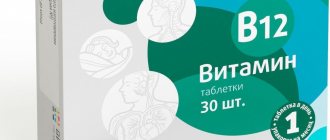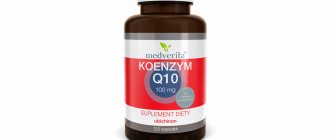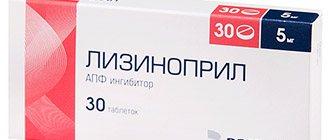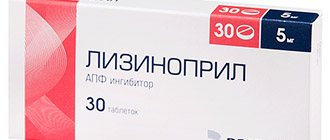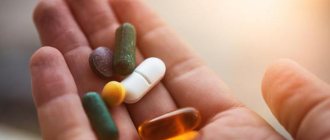A dry, obsessive cough often accompanies respiratory diseases. It can also occur due to allergies, stress, or exposure to irritating substances. Thanks to this protective reaction, the body tries to get rid of viruses, bacteria or dust.
When the cough becomes continuous and painful, taking a medicine that suppresses the cough reflex, for example, Omnitus, is indicated. This group of drugs should be taken with caution to avoid complications.
Compound
| Modified-release film-coated tablets | 1 table |
| active substance: | |
| butamirate citrate | 20 mg |
| excipients: lactose monohydrate - 218.5 mg; hypromellose - 70 mg; talc - 10 mg; magnesium stearate - 8 mg; colloidal silicon dioxide anhydrous - 2 mg; povidone - 1.5 mg | |
| film shell: hypromellose - 5.105 mg; talc - 4.7 mg; ethylcellulose - 3.14 mg; macrogol - 1.253 mg; titanium dioxide - 1.041 mg; dye “Sunset” yellow (E110) (11%) - 1.261 mg |
| Modified-release film-coated tablets | 1 table |
| active substance: | |
| butamirate citrate | 50 mg |
| excipients: lactose monohydrate - 230.5 mg; hypromellose - 85 mg; talc - 10 mg; magnesium stearate - 12 mg; colloidal silicon dioxide anhydrous - 6 mg; povidone - 1.5 mg | |
| film shell: hypromellose - 5.305 mg; talc - 4.95 mg; ethylcellulose - 3.183 mg; macrogol - 1.273 mg; titanium dioxide - 1.061 mg; crimson dye (“Ponso” 4R) (E124) - 2.122 mg; brown varnish (sunset yellow dye (E110), azorubine dye (E122), black dye (E151) - 0.106 mg |
| Syrup | 1 ml |
| active substance: | |
| butamirate citrate | 0.8 mg |
| excipients: sorbitol 70% (non-crystallizing) - 405 mg; glycerol - 290 mg; sodium saccharinate - 0.6 mg; benzoic acid - 1.15 mg; vanillin - 0.6 mg; anise oil - 0.15 mg; ethanol 96% - 3 µl; sodium hydroxide - 0.1 mg; purified water - up to 1 ml |
Description of the drug
Omnitus is sold in three dosage forms:
- tablets that contain 50 or 20 mg of butamirate citrate;
- syrup, 1 ml of which contains 0.8 mg of butamirate citrate;
- drops, 1 ml contains 5 mg of butamirate citrate.
The tablets have a round shape, a special yellow or orange coating. Packed in blisters of 10 pieces.
The syrup can be purchased in 200 ml bottles complete with a measuring spoon and instructions for use. It is a clear, colorless or slightly yellowish liquid with a vanilla aroma.
Drops are sold in 20 ml bottles equipped with a dosing device. They are a solution with a specific odor without color or with a slight yellow tint.
Pharmacokinetics
Absorption is high. After oral administration of syrup at a dose containing 150 mg of butamirate citrate, Cmax in plasma of the main metabolite (2-phenylbutyric acid) is observed after 1.5 hours and is 6.4 mcg/ml, when taking a modified-release tablet (50 mg) - 9 h and 1.4 μg/ml, respectively. T1/2 for syrup - 6 hours, for tablets - 13 hours. There is no cumulative effect. Butamirate citrate is rapidly hydrolyzed in plasma to 2-phenylbutyric acid and diethylaminoethoxyethanol. Both of these metabolites, which also have an antitussive effect, are significantly bound to plasma proteins, which explains their long-term presence in the plasma. Subsequently, the main metabolite 2-phenylbutyric acid is oxidized to 14C-p-hydroxy-2-phenylbutyric acid. All three metabolites are excreted by the kidneys, with the acidic metabolites being primarily glucuronic acid.
How does Omnitus work?
The therapeutic effect of the drug is due to the properties of the main active ingredient - butamirate, which is a centrally acting anti-cough agent.
Therefore Omnitus:
- directly affects the cough center and blocks debilitating coughing attacks;
- does not cause attachment or addiction;
- gives a bronchodilator effect;
- facilitates the breathing process;
- increases oxygen content in the blood.
The medicine does not depress respiratory function, does not have a sedative effect, and does not contribute to the retention of sputum in the bronchi.
Directions for use and doses
Inside. The tablets are taken before meals without chewing.
Tablets, 20 mg
Adults - 2 tables. 2–3 times a day; children over 12 years old - 1 table. 3 times a day; from 6 to 12 years - 1 table. 2 times a day.
Tablets, 50 mg
Adults - 1 table. every 8–12 hours
Syrup
Adults - 6 scoops (30 ml) 3 times a day; children over 9 years old (40 kg) - 3 scoops (15 ml) 4 times a day; from 6 to 9 years (22–30 kg) - 3 scoops (15 ml) 3 times a day; from 3 to 6 years (15–22 kg) - 2 measuring spoons (10 ml) 3 times a day.
Contraindications for use
The drug is not prescribed for hypersensitivity to any of the substances included in the tablets, drops or syrup.
Also contraindicated are:
- period of lactation and breastfeeding;
- for tablets with a dosage of 50 mg – age up to 18 years;
- for tablets with a dosage of 20 mg – preschool age;
- for tablets – impaired absorption of monosaccharides in the gastrointestinal tract, lactose intolerance, lactase deficiency;
- for drops – age up to two months;
- for syrup – age up to three years.
Since the syrup contains ethanol, it is prescribed with caution to persons with liver pathologies, brain diseases, alcohol dependence, epilepsy, who are prone to developing dependence on medications.
Omnitus prescription schemes
The dosage and frequency of administration are determined depending on the patient’s age, type of drug and indications.
In accordance with the instructions for use of Omnitus tablets, the medication is not chewed and taken before meals.
Take 1 tablet 50 mg 2-3 times a day.
Tablets 20 mg - adults, 2 pieces 2-3 times a day, children from 6 to 12 years old - 1 piece 2 times a day, from 12 years old, 1 piece 3 times a day.
Syrup is taken in volumes by age:
- children 3-6 years old – 10 ml three times a day;
- children 6-9 years old – 15 ml three times a day;
- children over 9 years old – 15 ml four times a day;
- adults – 30 ml three times a day.
Drops are prescribed to children four times a day:
- from two months to a year – 10 drops;
- from one to three years – 15 drops;
- from three years - 25 drops.
If symptoms persist for more than a week, you should consult your doctor.
Omnitus, syrup 0.8 mg/ml, 200 ml
Manufacturer
Hemofarm A.D., Serbia
Compound
1 ml of syrup contains: Active substance Butamirate citrate 0.8 mg; Excipients Sorbitol 70% (non-crystallizing) – 405.00 mg, Glycerol – 290.00 mg, Sodium saccharin – 0.60 mg, Benzoic acid – 1.15 mg, Vanillin – 0.60 mg, Anise oil – 0.15 mg, Ethanol 96% - 3.00 µl, Sodium hydroxide - 0.10 mg, Purified water - up to 1.00 ml.
pharmachologic effect
Pharmacodynamics Butamirate, the active substance of the drug Omnitus®, is a centrally acting antitussive agent. It does not belong to opium alkaloids either chemically or pharmacologically. Does not form dependence or addiction. Suppresses cough, having a direct effect on the cough center. Has a bronchodilator effect (expands the bronchi). Helps make breathing easier by improving spirometry (reduces airway resistance) and blood oxygenation (saturates the blood with oxygen). Pharmacokinetics Absorption - high. After oral administration of syrup in a dose containing 150 mg of butamirate citrate, the maximum plasma concentration of the main metabolite (2-phenylbutyric acid) is reached after 1.5 hours and is 6.4 μg/ml. Hydrolysis of butamirate, initially to 2-phenylbutyric acid and diethylaminoethoxyethanol, begins in the blood plasma. These metabolites also have antitussive activity and, like butamirate, are highly (about 95%) bound to plasma proteins, which results in their long half-life. 2-phenylbutyric acid is partially metabolized by hydroxylation in the para position. When taking the drug again, no accumulation is observed. The half-life is 6 hours. The three metabolites are excreted mainly through the kidneys; After conjugation in the liver, acidic metabolites are largely bound to glucuronic acid.
Indications
Dry cough of any etiology (for colds, flu, whooping cough and other conditions).
Use during pregnancy and breastfeeding
Contraindicated during lactation, the first trimester of pregnancy, children and adolescents under 3 years of age.
Contraindications
Hypersensitivity to the components of the drug, pregnancy (first trimester), breastfeeding period, children under 3 years of age. Fructose intolerance (the drug contains sorbitol).
Side effects
Classification of the frequency of adverse reactions: very often (≥1/10), often (≥1/100, <1/10), infrequently (≥1/1000, <1/100), rarely (≥1/10000, <1 /1000), very rare (<1/10000), including isolated cases. From the central nervous system: rarely - dizziness, drowsiness. From the digestive system: rarely - nausea, diarrhea. Allergic reactions: rarely - skin rash, itching, urticaria.
How to take, course of administration and dosage
Inside, before meals. The syrup contains 1 measuring spoon (volume 5 ml): Children: from 3 to 6 years (15-22 kg) - 2 measuring spoons (10 ml) 3 times a day from 6 to 9 years (22-30 kg) - 3 scoops (15 ml) 3 times a day over 9 years (40 kg) - 3 scoops (15 ml) 4 times a day Adults: - 6 scoops (30 ml) 3 times a day If cough persists for more than 5 days after starting treatment, you should consult a doctor. Instructions for opening the bottle The bottle is closed with a cap with a safety device that prevents children from opening it. In order to open the bottle, you need to press firmly on the top of the cap and turn it counterclockwise. After use, the bottle must be tightly closed; to do this, the bottle cap must be screwed tightly again.
Overdose
Symptoms: nausea, vomiting, drowsiness, diarrhea, dizziness, decreased blood pressure.
Treatment: orally - activated carbon, saline laxatives, if necessary - symptomatic therapy.
Description
Transparent, colorless or with a yellowish tint, viscous liquid with the smell of vanilla.
Equipment
Syrup 0.8 mg/ml. 200 ml of the drug in a dark glass bottle of hydrolytic group III, sealed with a polyethylene cap with first opening control. On the top side of the cap there is a diagram for opening the bottle. 1 bottle together with a polypropylene measuring spoon (volume 5 ml, with a line for a volume of 2.5 ml) and instructions for medical use of the drug in a cardboard pack.
Special instructions
The syrup contains sorbitol and saccharin as sweeteners, so the drug can be used by patients with diabetes.
Release form
Syrup
Storage conditions
At a temperature not exceeding 25 °C in consumer packaging. After opening, store the bottle in consumer packaging at a temperature of 15 to 25 ° C and use until the expiration date. Keep out of the reach of children.
Best before date
5 years. Do not use after the expiration date stated on the package.
Active substance
Butamirat
Dosage form
oral solution
Barcode and weight
Barcode: 8600097001007 Weight: 0.420 kg
Special instructions, side effects
Omnitus is approved for use in patients with diabetes mellitus, as it contains sorbitol and saccharin.
Simultaneous use with expectorants is prohibited in order to prevent stagnation of sputum in the bronchi, which can cause bronchospasm and the development of an infectious process in the lungs.
The medicine may cause drowsiness and dizziness, so caution should be exercised in activities that require increased alertness or speed of reaction.
In some cases, during treatment, undesirable effects may occur in the form of nausea or diarrhea, allergic reactions, itching, dizziness, urticaria, and various skin rashes.
Omnitus is stored at a temperature of 15-25°C, tablets - for two years from the date of release, syrup - five years, drops - two and a half years.
Price, where to buy, reviews
The price of Omnitus depends on the dosage form, the pricing policy of the pharmacy chain, and the region of sales. Tablets start from 225 rubles. for 10 pieces, syrup - from 230 rubles, drops - from 290 rubles. It is more convenient to buy medicine on the pharmacy website.
According to patient reviews, the drug works well for paroxysmal coughing at night, against the background of throat irritation caused by ARVI. There is a variety of dosage forms, an affordable price, and a minimal number of side effects.
Doctors consider Omnitus a modern and effective drug recommended for lingering dry cough.
